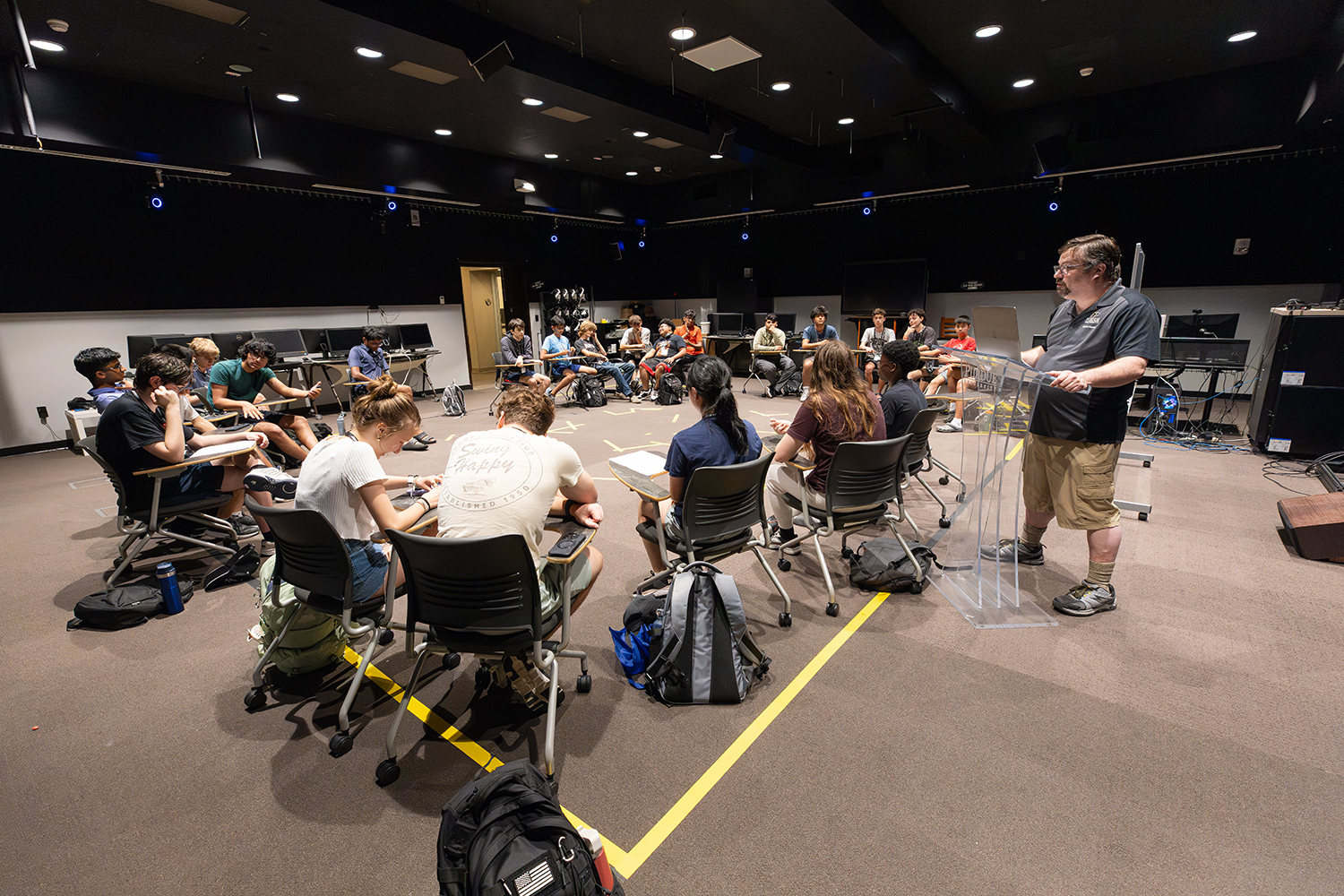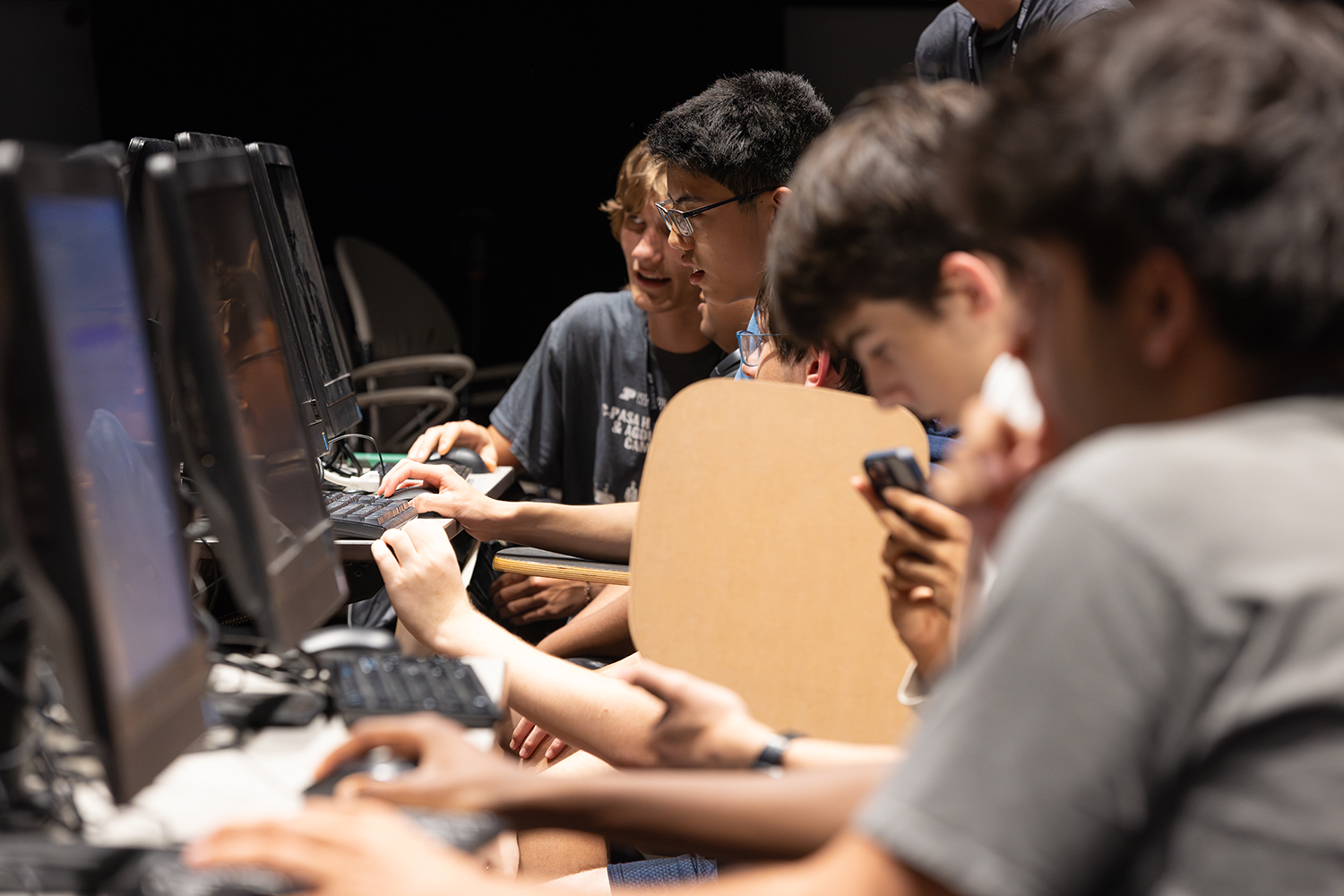Second annual RCAC summer camps are a huge success
The Rosen Center for Advanced Computing (RCAC) recently hosted two summer camps for high schoolers with the goal of introducing and developing cybersecurity and coding skills. With these camps, the students not only learned new skills, but also had the opportunity to earn college credits while experiencing campus life.
Both camps took place at Purdue’s West Lafayette campus from June 22nd through the 27th and were part of the Summer College for High School Students program at Purdue. RCAC hosted each of these camps last year as well, and they were well-received by both students and organizers alike. The demand for the programs this year was so high that each camp filled to max capacity within a week of being announced.
Code Explorers
The first camp  was “Code Explorers: Coding, Data, and Environmental Stories.” This camp was an immersive STEM program where the students engaged with coding, data collection, and environmental science. The 2025 coding class focused on analyzing and visualizing data related to Earth and Planetary Science. The students learned to code in Python for Data Science using Purdue RCAC’s JupyterHub and the Department of Computer Science labs. They gained hands-on experience in data collection, preparation, analysis, and visualization using datasets from both local and national Earth and planetary science resources.
was “Code Explorers: Coding, Data, and Environmental Stories.” This camp was an immersive STEM program where the students engaged with coding, data collection, and environmental science. The 2025 coding class focused on analyzing and visualizing data related to Earth and Planetary Science. The students learned to code in Python for Data Science using Purdue RCAC’s JupyterHub and the Department of Computer Science labs. They gained hands-on experience in data collection, preparation, analysis, and visualization using datasets from both local and national Earth and planetary science resources.
“Coding Explorers is designed to build student skillsets in Python scripting for data science,” says Nicholas Brasovan, a curriculum developer in the Department of Computer Science at Purdue, and one of the instructors for the camp. “The students were given four geological data sets from NASA and NOAA. Data sets included temperature metrics, sea level metrics, atmospheric CO2, and coal consumption metrics. The students were then guided on how to clean, analyze, and visualize the data in meaningful ways.”
The students that took part in the camp came from a variety of backgrounds, both in location and experience. Brasovan continues:
“This year’s cohort of students represented a regional and national student demographic. Students in the class came from a wide spectrum of computer programming backgrounds: some students came to camp with no coding experience, while others were quite advanced. The course curriculum proved to address the skills and educational needs of each student in the class. Students with little-to-no programming experience were able to learn fundamentals of Python coding for data science, while those with programming experience were able to build upon their foundation with more advanced data analysis and visualizations.”
CyberSafe Heroes
The second camp  was “CyberSafe Heroes: Empowering High School Students for a Secure Digital Future.” This camp focused on cybersecurity, with the goal of introducing students to key concepts in ethical hacking, encryption, and digital safety. Through hands-on labs and engaging activities, including escape rooms, hacking simulations, and meme contests,the students explored fundamental cybersecurity topics such as the CIA Triad, vulnerability management, and network security. Participants used industry-standard tools, including Kali Linux and Metasploit, and engaged with cybersecurity professionals in career panels, forging tangible connections to real-world roles in digital defense. As with the Code Explorers camp, the CyberSafe Heroes camp was open to students with any background, no prior-experience required. George Bailey is the director of cyberTAP at Purdue, and was one of the instructors for the CyberSafe camp. He had this to say about this year’s program:
was “CyberSafe Heroes: Empowering High School Students for a Secure Digital Future.” This camp focused on cybersecurity, with the goal of introducing students to key concepts in ethical hacking, encryption, and digital safety. Through hands-on labs and engaging activities, including escape rooms, hacking simulations, and meme contests,the students explored fundamental cybersecurity topics such as the CIA Triad, vulnerability management, and network security. Participants used industry-standard tools, including Kali Linux and Metasploit, and engaged with cybersecurity professionals in career panels, forging tangible connections to real-world roles in digital defense. As with the Code Explorers camp, the CyberSafe Heroes camp was open to students with any background, no prior-experience required. George Bailey is the director of cyberTAP at Purdue, and was one of the instructors for the CyberSafe camp. He had this to say about this year’s program:
“My experience teaching in the Purdue CyberSafe Heroes summer camp was both professionally enriching and personally rewarding. Working with enthusiastic young learners as they discovered the fascinating world of cybersecurity reminded me why I'm passionate about education and technology.” Bailey continues, “One of the most fulfilling aspects of the program was building and refining the lab environment. Creating hands-on learning experiences that allowed students to safely explore cybersecurity concepts gave me a deep sense of accomplishment. Watching students navigate through simulated scenarios and seeing their understanding develop in real-time reinforced my belief in experiential learning. The technical challenge of designing environments that were both educationally sound and engaging pushed me to grow as an educator and technologist.”
Overall the 2025 RCAC summer camps were a great success, receiving overwhelmingly positive feedback from both the students and the instructors. Suzanna Gardner, the Senior Research Operations Administrator for Outreach and Engagement at RCAC, serves as the primary organizer and director of the RCAC summer camps. She is thrilled with what the camps have achieved and the impact they have made in the lives of the students.
“It’s incredible to watch students light up when they realize that computing can help solve real problems—whether it’s protecting digital spaces or understanding our environment,” says Gardner. “With Code Explorers and Cyber Safe Heroes, we wanted to create experiences that felt meaningful and fun, where students could see themselves in these fields and start imagining what their future in tech might look like. I’m happy to say that over the past two years, we’ve done just that.”
RCAC would like to thank these volunteers for contributing both their time and energy and making these camps possible: George Bailey, Nicholas Brasovan, George Takahashi, Amanda Warren-Glowe, Taylor Graham, Smriti Bhatt, Baijian Justin Yang, Charles Fultz, George Takahashi, Luke Monroe, Jianguo Wang, Manasa Vemuri, Madiha Fathima, Eric Adams,and Cortney Bragg.
These camps were supported by the Anvil supercomputer. Anvil is one of Purdue University’s most powerful supercomputers, providing researchers from diverse backgrounds with advanced computing capabilities. Built through a $10 million system acquisition grant from the National Science Foundation (NSF), Anvil supports scientific discovery by providing resources through the NSF’s Advanced Cyberinfrastructure Coordination Ecosystem: Services & Support (ACCESS), a program that serves tens of thousands of researchers across the United States.
Researchers may request access to Anvil via the ACCESS allocations process. More information about Anvil is available on Purdue’s Anvil website. Anyone with questions should contact anvil@purdue.edu. Anvil is funded under NSF award No. 2005632.
To learn more about RCAC and future educational opportunities, contact rcac-help@purdue.edu.
Written by: Jonathan Poole, poole43@purdue.edu
